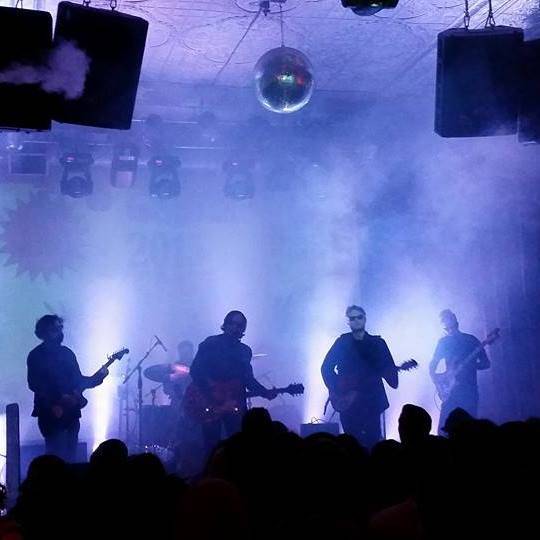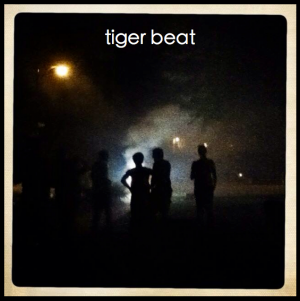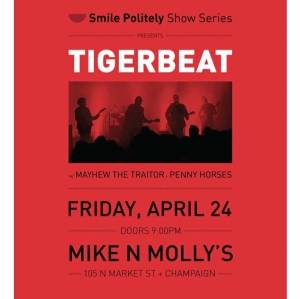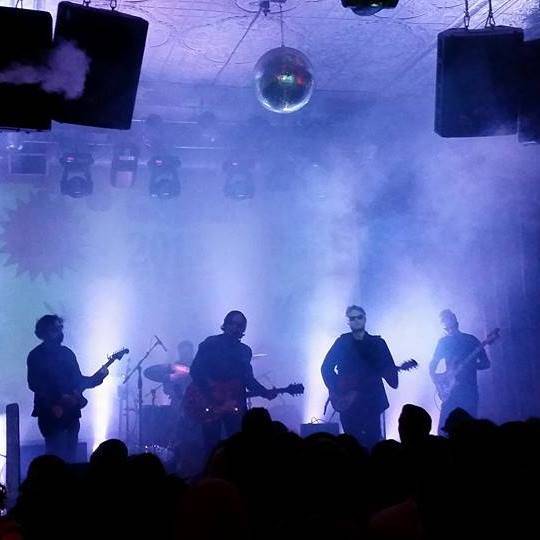
Last year, Katie Prosise did a pretty awesome and comprehensive interview with John Isberg of Tigerbeat. As I tried to prep for my own interview with Isberg I was trying to figure out what the hell I was going to talk to him about that wasn’t just “tell me what you’ve been up to.” Instead, we agreed to meet for a beer at Mike N Molly’s and I thought I’d just have a conversation with the songwriter and figure out who he is and see what comes of it.
After mistakenly stopping at Esquire and then realizing that he was not there, I pitched my beer and ran in to the site of Friday’s show featuring Isberg’s band Tigerbeat, Penny Horses, and Mayhew the Traitor. Isberg was there and pretty understanding of my little mistake and so we meandered over to the window booth of the bar and chatted.
Isberg is thoughtful in his responses, even when joking about his hometown of Aurora. The icebreaker was briefly discussing Wayne’s World and our mutual disappointment of the lack of a Stan Mikita’s Donuts. As the conversation pivoted we moved on to the evolution of his musical endeavors, which also intersects with his personal life.
“With Evil Tents we were almost like a gang,” he tells me. “Three of us lived together at the Velvet Elvis and we were almost like comrades in arms. It’s just a little different with Tigerbeat. People have a lot going on in their own lives and we just kind of come together as a release.”
 As Isberg’s music has grown and evolved so has his life away from writing songs. He’s a teacher and his musical companions in Tigerbeat (Michael Hicks, Thomas Skottene, and Matt Yeates) all are professionals in some capacity as well. It’s affected their ability to come together as often as maybe they’d like to, but at the same time Isberg thinks that this has actually helped them become stronger.
As Isberg’s music has grown and evolved so has his life away from writing songs. He’s a teacher and his musical companions in Tigerbeat (Michael Hicks, Thomas Skottene, and Matt Yeates) all are professionals in some capacity as well. It’s affected their ability to come together as often as maybe they’d like to, but at the same time Isberg thinks that this has actually helped them become stronger.
“Sometimes it’s kind of funny because that seems like the real world at times when everything else is just crazy. If we have a tough day or something we’re a bit more understanding and I think just getting that chance to play music is really very calming. Sometimes you just feel safe again.”
There’s something about hearing that music is a kind of safety net for a musician. The risk in putting your emotions and heart out on a record or a performance is something that seems more akin to a Nik Wallenda stunt than a place where safety and calmness exists but Isberg vaguely discusses how stressors in his life have kept him coming back to recording or writing music rather than stifling his creativity.
The EP that Tigerbeat released in 2013 carries emotional baggage for Isberg. Without going into detail, he mentioned that the songs recorded had a lot of feelings and night drives to the country to listen to his work helped him feel a relief that he wasn’t expecting.
“The last record I was going through some pretty heavy things that were pretty crazy,” he says pausing between words. “We took a break for about a month and coming back to playing those songs was a little hard because they have some pretty kind of upsetting emotions behind some of them. But when I got through that period and doing music and film helped me. If I told people stories about some of the shit from the last year they probably might not believe it.”
Honesty was palpable in Isberg’s words. We pivoted to the “lighter” subject of local music criticism. The longtime musician laughed about the roller coaster of responses to the much discussed buzz interview with Telepath. Isberg recalls the days of SPIN and Rolling Stone doing behind the scenes journalism on the recording of albums and having longer reviews of records as opposed to a handful of sentences telling readers to buy records.
“You know, if you go into the studio and fixate on the process, it’s boring. But if you focus on the creativity and how the songs were created that’s interesting. To me that’s more real, I guess.”
Isberg and I both kind of wavered on our current idea of local music criticism, but we were interested in seeing the progress of local music. Isberg’s thought is that the critiques of local music can be used to push local musicians to be great.
Strangely, the conversation meandered into the discussion of Father John Misty’s new record I Love You, Honeybear. Both of us were hooked on the same track’s opening lyrics (“The Night Josh Tillman Came To Our Apartment”) and we dissected the differences between the new record and FJM’s first record Fear Fun.
 “His lyrics are so great. It’s like, how does someone come up with that shit? I’ve had this falling out with Aron Stromberg over whether or not the new record is better than his first record. It’s just so good.”
“His lyrics are so great. It’s like, how does someone come up with that shit? I’ve had this falling out with Aron Stromberg over whether or not the new record is better than his first record. It’s just so good.”
Father John Misty doesn’t much lend itself to what Tigerbeat is up to, though it’s probable that it’s affected Isberg’s songwriting subconsciously. He is in the process of writing some new tunes and he describes what’s to come from Tigerbeat as “sad but also happy at the same time.”
Hope is what he’s headed towards.
“Instead of dwelling on some crazy shit, now you’re thinking about what is possible. Music can become more beautiful in that way. Hope is a great thing to have.”
Tigerbeat performs at the Smile Politely Show Series tonight with Penny Horses and Mayhew the Traitor. Doors open at 9 p.m.








